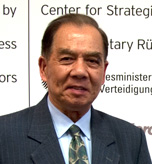Major General (Ret) CAI Bingkui - China Institute for International Strategic Studies, Beijing |
|||||||||||
"The Process Toward Peace and Economic Reconstruction Major General (Ret.) CAI Bingkui Afghanistan is an extremely sensitive place. Dealing with the Afghan situation properly is crucial to the security and stability of the region as well as the success of the international anti-terrorism struggle. Instead of an overall elaboration on the subject, I will focus on the following three points: The foreign military involvement, the role of the international community, and the development of China-Afghanistan relations. FOREIGN MILITARY INVOLVEMENT The fact that the Afghan war is now in its 10th year clearly demonstrates that the Afghan question cannot be settled by foreign military involvement alone. Currently, the internal situation in Afghanistan remains quite complicated. The extremist forces have not yet been conclusively put down. Terrorist attacks, drug trafficking, and organized trans-national criminal activities are still unbridled. There has been no obvious change to the complicated relationship between the central government and the local forces, and the power of the central government still remains limited. The process of economic reconstruction, while having achieved some measure of progress, is still beset by difficulties. THE ROLE OF THE INTERNATIONAL COMMUNITY The international community should be united and should, in cooperation with the Afghan government, treat both the symptoms and the root causes of the Afghan question in order to reach a permanent solution. It should increase its efforts to crack down on terrorism, drug trafficking, and organized crime in the region in order to help Afghanistan achieve greater stability and economic development. To create the necessary conditions for Afghans to exercise comprehensive control over their own country, it is also essential to enhance Afghanistan’s sovereignty, independence and development. We must pay more attention to promoting healthy social and economic development and to raising the living standards of the people. In order to achieve this, it is important to encourage the existing international mechanisms to strengthen their coordination on the Afghan question and to work together under U.N. guidance. The Obama Administration, which is in a difficult position in Afghanistan, announced its new strategy for Afghanistan and Pakistan aimed at enhancing the governance capabilities of the Afghan and Pakistani governments. The plan also calls for a short-term increase in military means in the region, in order to effectively squash the insurgency and thus pave the way for U.S. military forces to gradually withdraw from Afghanistan. However, the joint operation conducted not long ago in Marja, in southern Afghanistan, indicates that it is not possible to thoroughly wipe out the Taliban forces in a very short period of time. It has also shown that it is very difficult to persuade Taliban members to return to civil society and establish local governments in the areas originally controlled by the Taliban. Indeed, persistent and unremitting efforts are needed if we are to achieve this. This being said, the peace process and economic reconstruction efforts have made considerable progress in recent years thanks to the work of the government and the people of Afghanistan as well as the assistance of the international community. At present, the Karzai government is seeking peace talks with the Taliban and maintaining contacts with representatives of other military groups, political organizations, and social strata. Of course, it will be a challenge to finally realize national reconciliation since Afghanistan is a country with a complicated constitution of nationalities and opinions. The process of economic reconstruction is facing considerable difficulties at present due to various factors such as an unfavorable security environment and a capital deficiency. However, the international community is expected to extend further support and assistance Being a frontline country in the international anti-terrorism struggle, Pakistan has made important contributions and great sacrifices. According to information officially released not long ago by Pakistani authorities, more than 2,200 military personnel have died and some 6,200 have been injured in anti-terrorism operations. In addition, more than 3,000 people lost their lives in terror attacks in 2009. The social and economic development of Pakistan has been gravely affected by this. It is fully understandable that Pakistan anticipates further support and aid from the international community. CHINA-AFGHANISTAN RELATIONS In parallel with the start of the peace and reconstruction process in Afghanistan, the interaction and cooperation between China and Afghanistan has been restored and further developed in a number of fields. Politically, the Treaty of Friendship, Cooperation, and Good-neighborly Relations was signed and a partnership for comprehensive cooperation established. China respects the development path which the Afghan people have decided upon based on the specific conditions and situation within their own country. It also firmly supports Afghanistan in its efforts to safeguard its national independence, sovereignty, and territorial integrity. During President Karzai’s visit to China in March 2010, both countries signed the Agreement on Economic and Technical Cooperation and exchanged letters covering technical training and the granting of preferential tariffs for certain Afghan exports. In the security field, China assists Afghanistan in the building up of its national armed forces through military aid and personnel training. The two sides also carry out sound cooperation on anti-terrorism and drug-prohibition issues. |
|||||||||||
|
international workshop series on global security |
Top of page | Home | ©2009-2020
Center for Strategic Decision Research

